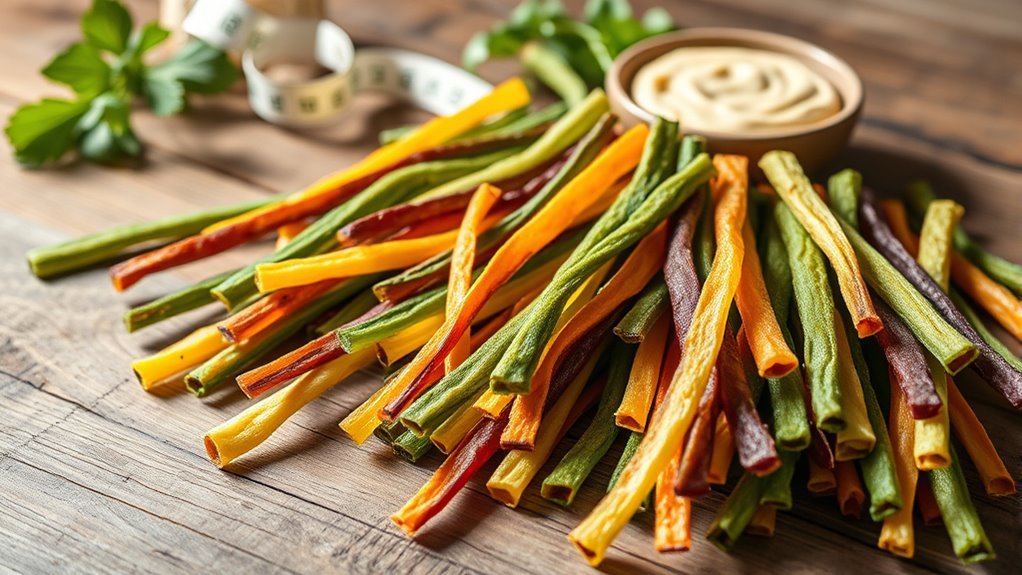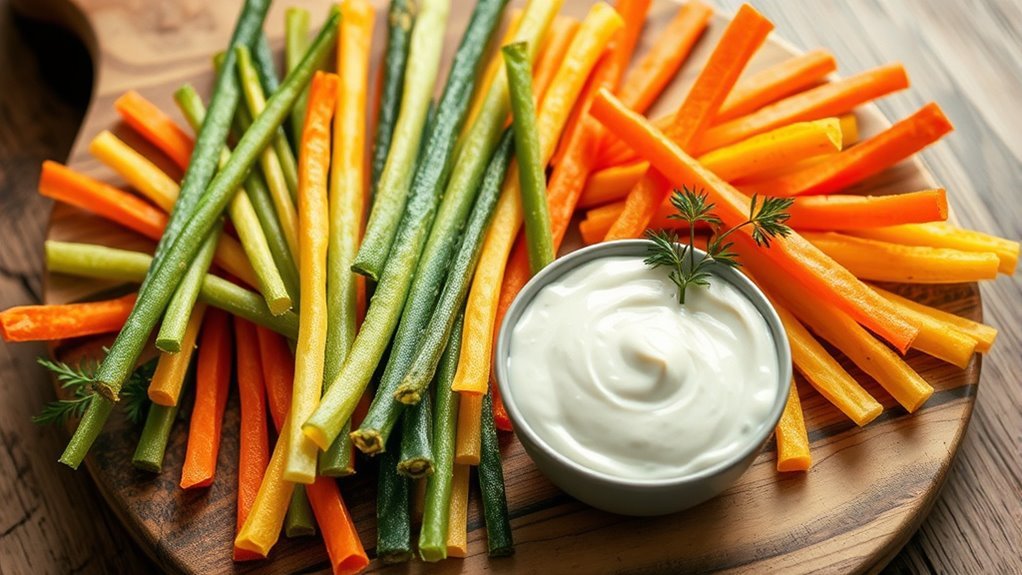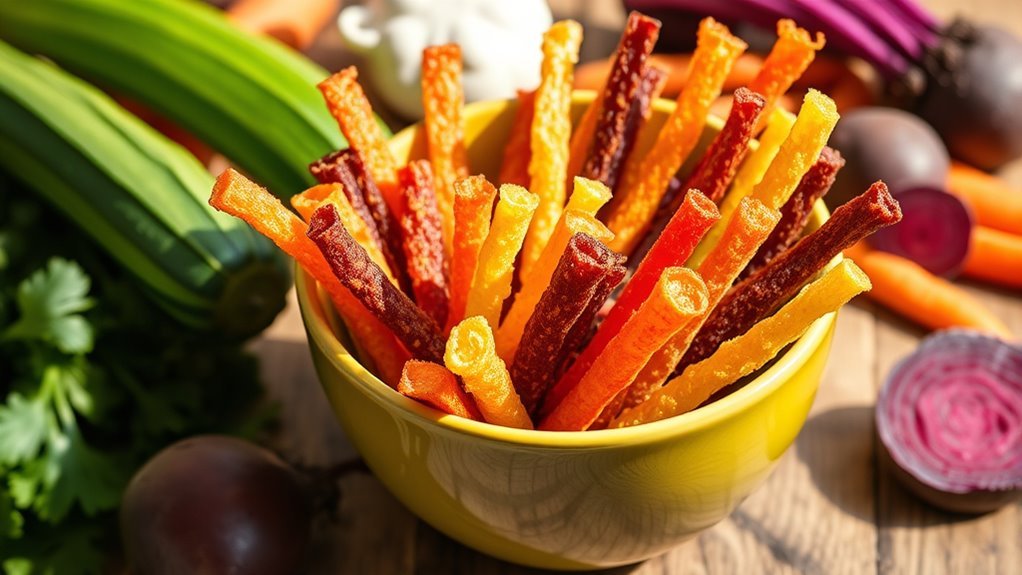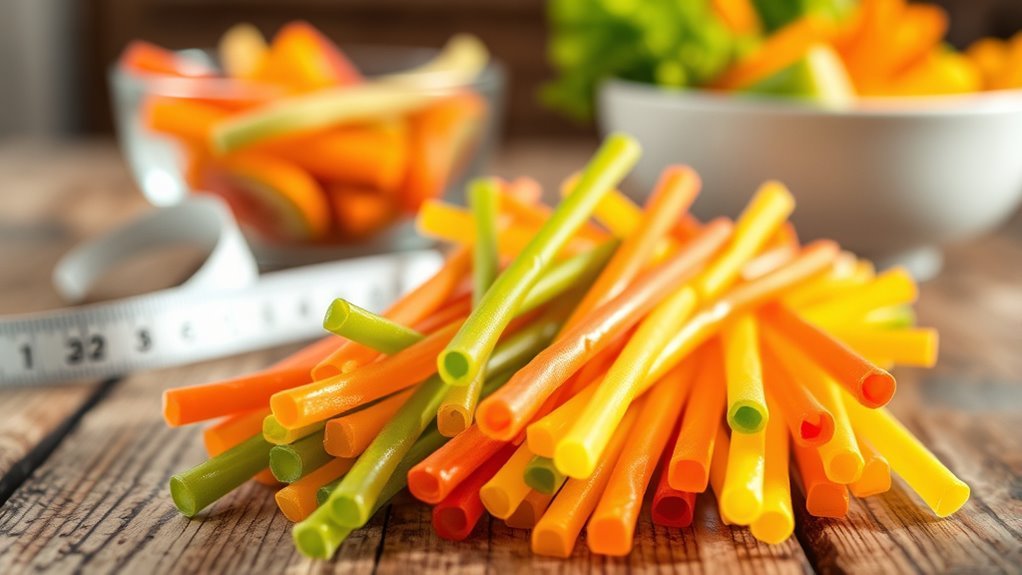Veggie straws aren’t keto-friendly due to their high carbohydrate content, which can disrupt your ketosis efforts. With about 17 grams of carbs per serving and minimal fiber, they can lead to blood sugar spikes, making it hard to maintain a low-carb diet. Instead of reaching for veggie straws, consider low-carb alternatives like cheese crisps or vegetable chips made from zucchini to better support your keto goals. There’s more to discover about healthy snacking options!
Understanding the Ketogenic Diet

While many diets focus on calorie counting, the ketogenic diet emphasizes a drastic reduction in carbohydrates, pushing your body into a state of ketosis. This metabolic shift encourages your body to burn fat for fuel instead of glucose, aligning with ketogenic principles. As you adapt to this new energy source, you’ll experience fat adaptation, where your body becomes more efficient at utilizing stored fat. This process can lead to increased energy levels and reduced cravings, offering a sense of freedom from constant hunger. It’s essential to choose the right fats, such as avocados and olive oil, while keeping your carb intake low. Understanding these foundational aspects can help you navigate the ketogenic landscape more effectively, empowering your dietary choices.
What Are Veggie Straws Made Of?

Veggie straws are a popular snack choice, often marketed as a healthier alternative to traditional chips. You’ll find that the veggie straw ingredients typically include potato starch, corn starch, and a blend of vegetable powders like spinach, tomato, and beet. These ingredients are often fried or baked, depending on the brand. It’s important to check the nutritional labeling, as some varieties can be high in sodium and carbohydrates, which might not align with your dietary goals. While they might seem like a guilt-free snack, understanding what’s inside helps you make informed choices. So, if you’re looking for a snack that fits your lifestyle, being aware of these components is vital for your overall health journey.
Nutritional Breakdown of Veggie Straws

Although they may appear to be a healthier snack option, the nutritional breakdown of veggie straws reveals some important considerations. When evaluating their nutrient density, it’s essential to look closely at ingredient sourcing and overall nutritional value.
| Nutritional Component | Amount per Serving |
|---|---|
| Calories | 130 |
| Total Fat | 6g |
| Carbohydrates | 17g |
| Protein | 1g |
| Fiber | 1g |
While veggie straws might be appealing due to their colorful appearance and crunch, they often fall short in delivering significant vitamins and minerals compared to whole vegetables. Paying attention to these factors can help you make more informed snack choices that align with your dietary goals.
Carb Content in Veggie Straws
When considering snack options, you might be surprised to find that veggie straws contain a notable amount of carbohydrates. Typically, a serving size of veggie straws—about one ounce—has roughly 15 grams of carbs. This carb content primarily comes from potato starch and cornmeal, making veggie straws a significant carb source compared to other low-carb snacks. If you’re following a ketogenic diet, you’ll want to be mindful of how these carbs fit into your daily allowance. While they can be a fun, crunchy option, their carb content can add up quickly, potentially hindering your ketosis goals. Balancing indulgence with your dietary needs is essential, so always check the serving sizes and nutritional labels before snacking.
Comparing Veggie Straws to Other Snack Options
When considering snacks, it’s important to analyze the nutritional content of veggie straws compared to other options. You might find that low-carb alternatives like nuts or cheese crisps offer different benefits and can help with portion control. Understanding these differences can guide you in making healthier snack choices that align with your dietary goals.
Nutritional Content Analysis
Veggie straws may seem like a healthier alternative to traditional snack options, but a closer look at their nutritional content reveals a more complex picture. While they do contain some vegetables, their nutrient density is relatively low compared to whole foods like fresh veggies or nuts. Veggie straws often lack significant dietary fiber, which is essential for digestive health and can keep you feeling full longer. For instance, a serving may provide minimal vitamins and minerals, while options like raw carrots or celery offer more nutrients and fiber without the added fats or preservatives. So, if you’re looking for a snack that fuels your body, you might want to reconsider veggie straws in favor of more nutrient-rich alternatives.
Low-Carb Alternatives Comparison
While veggie straws may be marketed as a low-carb snack option, they aren’t your only choice if you’re following a ketogenic diet. You can explore these tasty alternatives that align better with your low-carb goals:
- Celery sticks – Crunchy and invigorating, they’re a great low-carb vegetable.
- Cucumber slices – Hydrating and versatile, perfect for dipping.
- Radishes – Spicy and satisfying, they add a unique flavor to your snack time.
- Keto cheese crisps – A flavorful option that satisfies your crunch cravings while keeping carbs in check.
These snacks not only keep your carb count low, but they also offer essential nutrients, making them excellent keto snacks. Choose wisely, and enjoy the freedom of sticking to your diet!
Snack Portion Control Tips
How can you effectively manage portion sizes when snacking on veggie straws compared to other options? Start by measuring your snack sizes. For veggie straws, a standard serving is about 1 ounce, so use a kitchen scale or pre-portioned bags to avoid mindless munching. When comparing them to other snacks like chips or nuts, consider their calorie density. Veggie straws often contain fewer calories, but it’s easy to overindulge. Practice mindful eating by savoring each bite and focusing on your hunger cues. This approach helps you enjoy your snacks without guilt. Remember, balance is key. Incorporating a variety of snacks, along with portion control, lets you enjoy your favorites while staying aligned with your dietary goals.
Potential Health Risks of Veggie Straws
When considering veggie straws, it’s important to be aware of their high carbohydrate content, which can impact your keto goals. Additionally, many veggie straws are made from processed ingredients that may not align with a whole-foods approach to nutrition. Understanding these factors can help you make more informed choices about your snacks.
High Carbohydrate Content
Veggie straws may seem like a healthier alternative to traditional snacks, but their high carbohydrate content can pose potential health risks, especially for those following a ketogenic diet. With a significant amount of high sugar and wheat content, these snacks can quickly derail your low-carb goals. Here are some considerations:
- Blood Sugar Spikes: The high carbohydrate levels can lead to rapid spikes in blood sugar.
- Keto Violation: Consuming veggie straws may exceed your daily carb limit, making keto compliance difficult.
- Cravings: The high sugar content can trigger cravings for more carbs.
- Nutritional Deficiency: Relying on veggie straws can lead to a lack of essential nutrients in your diet.
Being mindful of these factors can help you make more informed dietary choices.
Processed Ingredients Concerns
While you might think that veggie straws offer a healthier snack option, many of their processed ingredients raise concerns about potential health risks. Often made from potato or corn starch, these snacks lack the nutritional benefits of whole vegetables. Additionally, veggie straws may contain additives like artificial flavors, preservatives, and unhealthy oils, which can lead to adverse health implications. Regularly consuming such processed ingredients might contribute to inflammation or digestive issues, particularly for those with sensitivities. It’s essential to weigh these factors when considering veggie straws as part of your diet. Remember, not all snacks labeled as “healthy” are created equal, and being aware of what you’re eating empowers you to make informed choices.
Alternatives to Veggie Straws for Keto Snacking
If you’re looking for tasty alternatives to veggie straws that align with a keto diet, several options can satisfy your snack cravings without compromising your carb intake. Here are some keto friendly snacks and low carb options to contemplate:
- Cheese Crisps – Baked cheese snacks that offer a satisfying crunch with minimal carbs.
- Vegetable Chips – Make your own with low-carb veggies like zucchini or kale, baked to perfection.
- Nuts and Seeds – Almonds, walnuts, or pumpkin seeds provide healthy fats and protein.
- Olives – A flavorful, low-carb option rich in healthy fats that can curb your hunger.
These alternatives not only fit your dietary needs but also allow you to enjoy snacking freedom without guilt!
Frequently Asked Questions
Can I Eat Veggie Straws on a Strict Keto Diet?
When you’re on a strict keto diet, choosing snacks wisely is essential. Veggie straws might seem like a tasty option, but they often contain more carbs than you’d want. While they can be a fun veggie alternative, they typically don’t fit into keto-friendly snacks due to their higher carbohydrate content. If you’re craving something crunchy, consider making your own low-carb veggie chips instead for a satisfying, guilt-free treat!
How Many Veggie Straws Can I Have on Keto?
Picture yourself at a party, surrounded by tempting snacks but sticking to your keto goals. You might be wondering about veggie straw portions. While they’re a crunchy alternative, they’re often higher in carbs than you’d like. A small handful, about 10-15 straws, could fit into your daily carb limit, but it’s best to explore keto snack alternatives like nuts or cheese crisps for a guilt-free treat. Balance is key, so choose wisely!
Are Homemade Veggie Straws More Keto-Friendly?
Homemade veggie straws can definitely be more keto-friendly than store-bought options. When you make them yourself, you control the ingredients and can use healthier alternatives, like zucchini or kale, which are lower in carbs. Plus, you can avoid added sugars and preservatives often found in commercial snacks. There are plenty of homemade recipes online that cater to keto diets, allowing you to enjoy a crunchy snack without straying from your goals.
Do Veggie Straws Contain Added Sugars?
You might be surprised to learn that nearly 70% of commercial veggie straws contain added sugars. When you explore the nutritional content through an ingredient analysis, you’ll often find that these snacks can be misleadingly marketed as healthy. While they may seem like a better option, it’s essential to check the labels for added sugars and other ingredients that could impact your dietary choices. Stay informed to make the best decisions for your snacking freedom!
What Snacks Are Better Than Veggie Straws for Keto?
If you’re looking for snacks better than veggie straws for keto, consider cheese crisps and nut butter. Cheese crisps are low in carbs and high in protein, making them a satisfying choice. Nut butter, on the other hand, is rich in healthy fats and can be enjoyed with celery or just on its own. Both options can keep your cravings at bay while sticking to your keto goals, giving you the freedom to enjoy tasty snacks.
Frequently Asked Questions
1. Are Veggie Straws keto-friendly?
Veggie Straws are generally not considered keto-friendly due to their carbohydrate content. While they are made from vegetables, they often contain a significant amount of starch and added sugars, which can kick you out of ketosis. A typical serving can have around 15 grams of carbohydrates, which is high for a keto diet that usually restricts daily intake to about 20-50 grams.
2. What are the main ingredients in Veggie Straws?
Veggie Straws are primarily made from potato starch, corn starch, and various vegetable powders (such as spinach, tomato, and beet). They are often fried or baked, which adds to their calorie content. Although they may sound healthy, the processing and starch content make them less suitable for a keto diet.
3. What snacks can I eat on a keto diet instead of Veggie Straws?
Instead of Veggie Straws, consider low-carb snacks such as cheese crisps, pork rinds, or homemade kale chips. Nuts and seeds are also great options, as they are low in carbs and high in healthy fats. Additionally, raw vegetables like celery, cucumber, or bell peppers paired with a high-fat dip like guacamole or cream cheese can be satisfying alternatives.
4. Can I make my own keto-friendly veggie snacks?
Yes, making your own keto-friendly veggie snacks is a great way to control the ingredients and carbohydrate content. You can bake or air-fry vegetables like zucchini, radishes, or cauliflower with olive oil and seasonings to create crispy snacks. Dehydrated vegetables can also be a great option if you’re looking for something crunchy without the added carbs.
5. Are there any brands that offer keto-friendly veggie snacks?
Yes, several brands offer keto-friendly snacks that feature vegetables but maintain low carbohydrate counts. Look for products labeled as low-carb or keto, specifically those that use ingredients like almonds, coconut flour, or seeds as their base. Brands like ‘Keto Crunch’ and ‘Kiss My Keto’ offer snack options that are more aligned with a ketogenic lifestyle.
References
- https://www.healthline.com/nutrition/are-veggie-straws-keto-friendly
- https://www.verywellfit.com/are-veggie-straws-keto-friendly-5183104
- https://www.ketodietapp.com/Blog/lchf/Are-Veggie-Straws-Keto-Friendly
- https://www.ncbi.nlm.nih.gov/pmc/articles/PMC7071812/
- https://www.webmd.com/diet/obesity/ss/slideshow-healthy-snacks
- https://www.eatright.org/food/nutrition/dietary-guidelines-and-myplate/what-is-a-healthy-snack
- https://www.cdc.gov/healthyweight/healthy_eating/snacking.html


